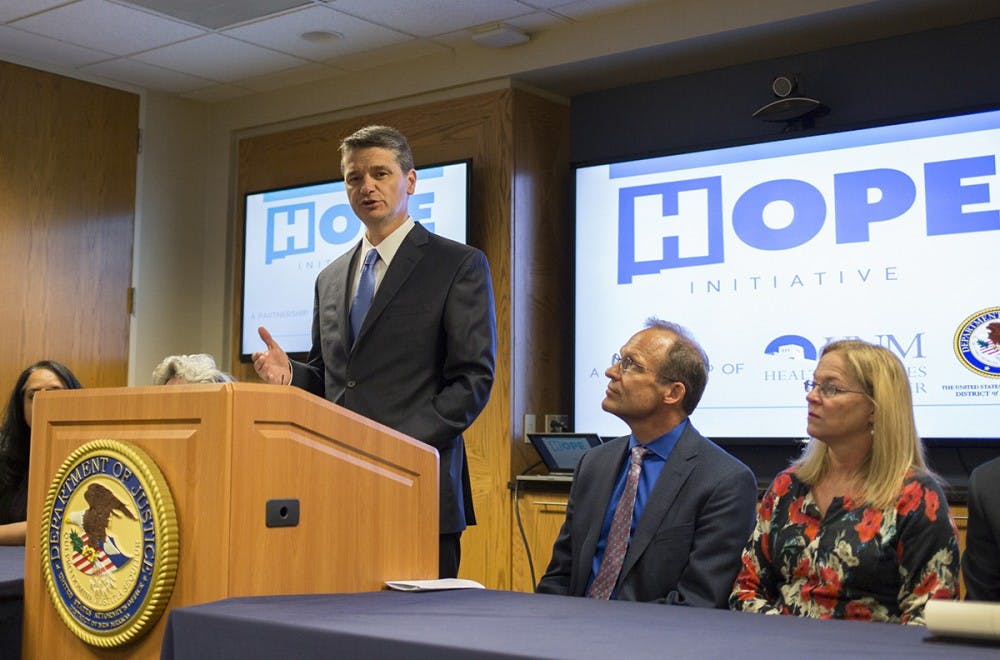The UNM Health Sciences Center and the U.S. Attorney’s Office are partnering together to fight the epidemic of heroin and opioid prescription drug abuse.
The New Mexico HOPE Initiative aims to target the abuse of heroin and opioid drugs through a comprehensive strategy that focuses on “prevention and education, treatment, law enforcement, re-entry and strategic thinking,” UNM and U.S. Attorney’s Office’s officials said.
Damon Martinez, U.S. Attorney for New Mexico, said that the HOPE Initiative’s acronym stands for Heroin Opioid Prevention and Education.
“The HOPE Initiative is a realization that we have an epidemic concerning heroin and opioid prescription drugs and the realization is also that there is a law enforcement component to it as well, but we cannot do it by ourselves,” he said.
Ryan Cangiolosi, chief strategic advisor at HSC and the Office of Chancellor Paul Roth, said Martinez approached Roth with the idea of starting the collaboration knowing that “you cannot incarcerate your way out of this problem; it is really going to take a whole team effort in regard to education, prevention, treatment and law enforcement.”
Martinez said the campaign is a comprehensive approach to dealing with heroin and prescription opioid overdose.
“The statistics that we are dealing with are unfortunately quite staggering. We have the second highest overdose rate in the U.S.,” he said.
He said that there were 540 overdose deaths in New Mexico in 2014.
“Breaking that down, we also know that three out of four of those overdose deaths were attributed to irresponsible prescription opioid or heroin drug use,” he said.
He said that sixty percent of the deaths were caused by prescription opioids, 30 percent by heroin and 10 percent by a combination of both.
He said that although the U.S. population is only 4.6 percent of the world’s population, the U.S. uses 80 percent of the world’s production of opioid prescription drugs.
He said that for every overdose death, there are 130 people who abuse or are otherwise dependent on drugs.
Get content from The Daily Lobo delivered to your inbox
“We also know that for every overdose death, there are 825 non-medical users,” he said.
Martinez said the Attorney’s Office has also made changes in how they prosecute in order to deal with the epidemic.
“Our traditional model is to prosecute drug trafficking organizations, but because of this epidemic, we have expanded and rethought how we prosecute. Now we are not only prosecuting drug trafficking organizations, especially heroin trafficking organizations, but in addition to that we are now prosecuting the registrants - those individuals who are registered with the DEA who create pill mills,” he said.
Martinez said the Attorney’s Office is also prosecuting people who write false prescriptions to get the drugs.
“We are also going after those individuals who violently rob pharmacies to steal these prescription drugs and we have a lot of success in this area,” he said.
In 2014 and the beginning of 2015, there were 23 pharmacy robberies in New Mexico, and the DEA indicates that between these robberies approximately 72,000 pills were taken, he said.
“Some of these robberies were violent. The robber came with a weapon and struck someone’s face with the weapon. In the last year, this part of the year going back to spring last year, there has only been three pharmacy robberies,” he said.
Cangiolosi said drug overdose is a major problem in New Mexico, and HSC wanted to be a part of the solution.
“At HSC we have several programs that deal with drug abuse like psychiatric hospital. All of them play an important role with regards to treating individuals who might have a problem with opiod addiction or other drugs like heroin,” he said.
He said all these programs offer HSC an opportunity to play a major role in the HOPE Initiative.
“On the education side, we are also running several programs. Legislation was passed few years back that individuals who have the right to prescribe opioid have to take a class, get continuing education and our doctors at HSC provide that education and our doctors have also provided the curriculum statewide,” he said.
A media and awareness campaign has also been launched as part of the initiative.
“We have now strategically placed around 15 billboards around schools, and these billboards are for creating conversation between parents and children about this epidemic,” Martinez said. “We have also started a new website, and individuals who are looking for information can go there.”
Sayyed Shah is the assistant news editor at the Daily Lobo. He can be contacted at assistant-news@dailylobo.com or on Twitter @mianfawadshah.






